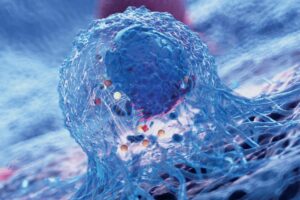What is already known
The prevalence of inflammatory bowel diseases (IBD) is on the rise, and there are no existing treatments that are effective for all patients. Anti-inflammatory drugs and immunosuppressive treatments can ease some of the condition’s symptoms, but up to 40% of people with moderate or severe disease fail to respond to therapy.
What this research adds
Researchers generated several compounds that inhibit the enzyme that becomes unusually active in the colon of people with Crohn’s disease or ulcerative colitis. Among these compounds, the team identified one called (S)-IBD3540, which reduced inflammation in the colon of mice with colitis. The compound also restored the animals’ normal colon structure, and it protected human colon cells grown in a dish from oxidative stress.
Conclusions
The findings suggest that (S)-IBD3540 is a promising approach for treating IBD in people.
The prevalence of inflammatory bowel diseases (IBD) is on the rise, and there are no existing treatments that are effective for all patients. Now, researchers have identified an inhibitor of the enzyme that becomes unusually active in the colon of people with IBD. When given to mice with colitis, the compound reduced inflammation in the colon and restored the animals’ normal colon structure.
The findings, published in Science Translational Medicine, suggest that the compound is a promising approach for treating IBD in people.
“The idea that we’ve discovered a brand new therapeutic target and successfully developed a well-tolerated and efficacious pill to inhibit the target is really exciting,” says study senior author Barbara Slusher at Johns Hopkins University School of Medicine in Baltimore, Maryland.
Although anti-inflammatory drugs and immunosuppressive treatments can ease some of IBD’s symptoms, up to 40% of people with moderate or severe disease fail to respond to therapy.
An enzyme called glutamate carboxypeptidase II, or GCPII, has emerged as a promising therapeutic target in IBD. The enzyme is up-regulated in people with Crohn’s disease or ulcerative colitis as well as in mouse models of the condition. So, Slusher and her team set out to generate several compounds that inhibit GCPII.
Dampening inflammation
The researchers screened three of the compounds generated in a mouse model of acute colitis. Each compound was given to mice orally once a day. Of the compounds, only one — called (S)-IBD3540 — reduced inflammation in the mice’s colon.
(S)-IBD3540 inhibited about 75% of GCPII activity in the colon, and showed improved efficacy compared with drugs that are currently used to treat Crohn’s disease and ulcerative colitis.
Mice treated with (S)-IBD3540 had improved stool consistency and less rectal bleeding, the researchers found. The team designed (S)-IBD3540 to stay in the gut — a feature that should improve its safety and lower the risk of exposure to the rest of the body when given orally. Indeed, treated mice showed no apparent adverse side effects.
Towards the clinic
Next, the researchers tested (S)-IBD3540 on ‘mini-guts’ grown in a lab dish from patient biopsy tissues. The compound protected human colon cells from oxidative stress and reinforced the integrity of the barrier typically formed by these cells.
“This is the first demonstration of an oral GCPII inhibitor protecting gut function,” says lead investigator Diane Peters. “(S)-IBD3540’s efficacy in mice and human pre-clinical models, with no evidence of toxicity, is highly encouraging.”
Further studies are in progress to facilitate the translation of (S)-IBD3540 to the first trials in humans, the authors say.











